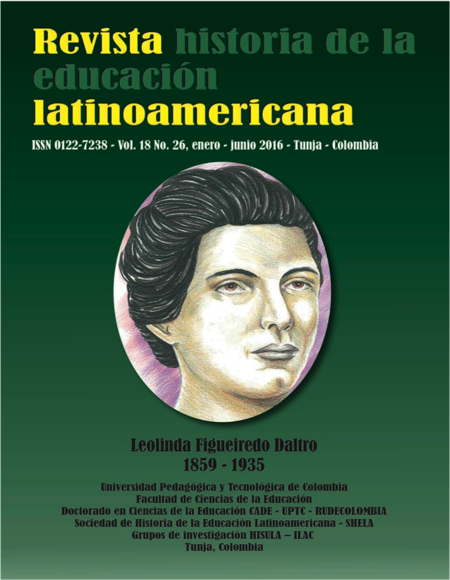Differences in a space of equals: gender relations in a Rural Teachers College (1950-1960)

Abstract
In this study, we examine the topic of a rural boarding school based on the narratives of subjects who had an instructional experience in an educational public institution in the city of Osório/ RS, Brazil, during a rural teachers training project.The subject and the objective of this research fall in the field of History of Education, and the development of gender relations in a coeducational school in the first half of the XX century.This study assumes memory as a document and oral history as methodology.The school represented to these youth the possibility of getting to know a world different from their familiar culture. It also promoted the dissemination of knowledge and enabled socialization. Plurality, co-education, and harmonious living seem to encapsulate the memories of this institution in Osório as an extraordinary school, a unique experience in the life of those students and teachers. This article discusses the ease of access to rural teacher training by young men who had the guarantee of a permanent situation at school as boarders. This benefit may explain why the profession of rural teacher was sought to a greater extent by men rather than women.
Keywords
Journal History of Latin American Education; gender relations; memories of teachers and students; rural education
Author Biography
Dóris Bittencourt Almeida
Doutora em Educação, professora da Faculdade de Educação/UFRGS.Grupo de Pesquisa EBRAMIC/Educação no Brasil: memória, instituições e cultura escolar - CNPQ.
Luciane Sgarbi Grazziotin
Doutora em Educação, professora do Centro de Ciências Humanas na Graduação e no PPGEdu/UNISINOS.
References
- Janaina Amado, O grande mentiroso: tradição, veracidade e imaginação em História Oral.
- Revista História 14, São Paulo (1995): p. 125 – 136.
- Fabrício Carpinejar, As solas do sol.(Rio de Janeiro: Bertrand do Brasil, 2005) p. 120. DURLO, Cleto Vicente (org.). Memórias de meio século da Rural. (Santa Maria: Pallotti,
- p. 98.
- Antoinette Errante, Mas aßnal, A Memória é de Quem?Kistórias orais e modos de lembrar e
- contar. História da Educação 4, n. 8. Pelotas (2000): UFPel. p. 141 – 174.
- Consuelo, Flecha García, “Las relaciones de género y la educación: de la tradición a la sociedad avanzada”. In: La memoria y el deseo: cultura de la escuela y educación deseada. Humanidades pedagógica, Eds Agustín Escolano Benito,; José Maria Hernández Díaz(Valencia: tirant ló Blanch 2002) p. 378-401.
- Gwyn Prins,“História Oral”, In A escrita da História: novas perspectives, eds. Peter Burke, (org.). (São Paulo: Editora da Universidade Estadual Paulista, 1992) p. 163 - 198. JamesFentresse e Chris Wickham. Memória social: novas perspectivas sobre o passado.
- (Lisboa: Teorema, 1992) p. 278.
- Joan Scott, Gênero: uma categoria útil da análise histórica. Educação e Realidade. 16(2), Porto Alegre (1990): p. 5 – 22.
- Joan Scott, “História das mulheres” ”. In A Escrita da história: Novas perspectiva, eds. Peter Burke,(São Paulo: UNESP, 1992), p. 354.
- Luciane Sgarbi Grazziotin,“Memórias recompondo tempos e espaços da educação – Bom Jesus/RS (1913-1963)”,(Tese de doutorado In, PUCRS, j2008), 285. 37.
- Michel Foucault, A arqueologia do saber. (Rio de Janeiro: Forense Universitária 1995) p. 238. Michelle Perrot, As mulheres ou os silêncios da história. (Bauru, São Paulo: EDUSC, 2005). Margareth Rago. O efeito- Poucault na historiograßa brasileira. Tempo Social; Revista de
- Sociologia. USP. São Paulo, 7(1-2), 1995, p. 69-82.
- Maria Stephanou e Maria Helena Câmara Bastos. “História, Memória e História da Educação”, In. Histórias e memórias da educação no Brasil, eds Maria Stephanou e Maria Helena Câmara Bastos (Petrópolis: Vozes, 2005) volume III, p. 416 –429.
- Nadir Zago,“Aentrevista e seu processo de construção: reflexões com base na experiência prática de pesquisa”,In: Itinerários Investigativos, eds. Nadir Zago, Marília Pinto de Carvalho,(Rio de Janeiro: DP&A, 2003, p. 287-309.
